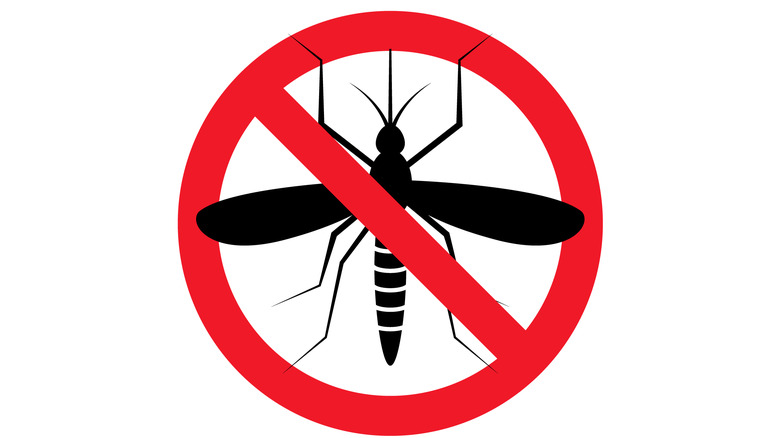The Game-Changing Camping Aid Too Many People Avoid Because They Think It's Toxic
Summer is the time of year when the outdoors beckon. Whether you're heading out for a weekend of camping, hitting the trail for hiking, or jumping in a kayak to explore a waterway (like this hidden paddlers' paradise in California), the warm months of the year are often when nature hits sweetest. That said, the higher temperature often brings out an unwelcome element: bugs.
Insects are a fact of life when out in nature — especially mosquitoes — who emerge in thick swarms in some locales. A plague of blood-suckers can be enough to ruin a trip, and while you can elect to head to some destinations where pesky mosquitoes won't be a problem, you're likely to encounter them (as well as gnats and biting flies) most anywhere in North America when the temperature is right. This also goes for pests such as chiggers, fleas, and potentially disease-carrying ticks, so it's best to provide yourself with defense.
Covering your body is one good way to avoid being bitten. This may even include wearing a mosquito net, which while effective, can also be annoying and even feel claustrophobic. Another effective defense is insect repellent, and nothing is as effective as the compound known as DEET. However, due to its ultra-strong chemical smell, many believe using DEET can be harmful to human health, a notion arguably based on unfounded fear rather than scientific evidence.
What is DEET?
DEET is a mixture of chemicals that goes by the scientific name N,N-diethyl-meta-toluamide. The substance was invented in 1946 by the US military as a defense against mosquitoes who plagued American soldiers in the Pacific theater during World War II. It was approved for US civilian use in 1957, and has been an active ingredient in many insect repellents ever since.
DEET is not an insecticide, meaning it doesn't kill bugs, but instead repels them with its noxious smell, and today over 200 million people use it worldwide. While some just employ DEET to make their camping trip much more pleasant, it's also an effective way to prevent insect-borne diseases such as malaria, dengue fever, West Nile virus, Zika virus, Lyme disease, and Rocky Mountain spotted fever.
DEET-infused products range from sprays to liquids, lotions, towelettes, and roll-ons, and earn about 9.4 billion dollars worldwide. The amount of DEET in any given bug repellent can be anywhere from 5% to 99% (though a 20%-30% DEET concentration is all you need for up to five hours of protection), and the reason its use is so widespread is due to how well it does its job. "It's stunningly effective," Dr. Joseph Kennedy, a physician and medical toxicologist at the University of Vermont Medical Center, told The New York Times.
Is DEET safe?
DEET developed a scary reputation in the '80s, when several people died after drinking the substance. Some people also confuse it with the similar-sounding (and now banned) pesticide DDT, which was found to cause a host of health problems, including cancer and birth defects. DEET is a caustic-smelling chemical cocktail that is only approved in the US for use on skin, hair, clothes, and footwear. and as such it can cause skin irritation. It is also extremely unpleasant when it gets in your eyes or mouth, and there have been exceedingly rare reports of it causing seizures — but only once in every 100 million uses.
DEET's noxious chemical odor is precisely what makes it so effective, and despite the fact it may smell toxic, there is no evidence that it is carcinogenic. Studies have shown no link between DEET use and cancer, nor does it cause pregnancy-related problems or birth defects. DEET is also safe for children, though concentrations less than 24% are recommended, and a little goes a long way. Kids also should never apply it on their own.
The most important thing to keep in mind about DEET is that it should only be used as directed. This means never applying it to open cuts or irritated skin, not spraying it your eyes, avoiding inhaling or ingesting it, and trying to limit its use, as the rare negative health incidents linked to DEET have mostly been when people have gone overboard with its application. Now that you've found a way to deal with the bugs, here are some simple tips for sleeping comfortably while camping.


